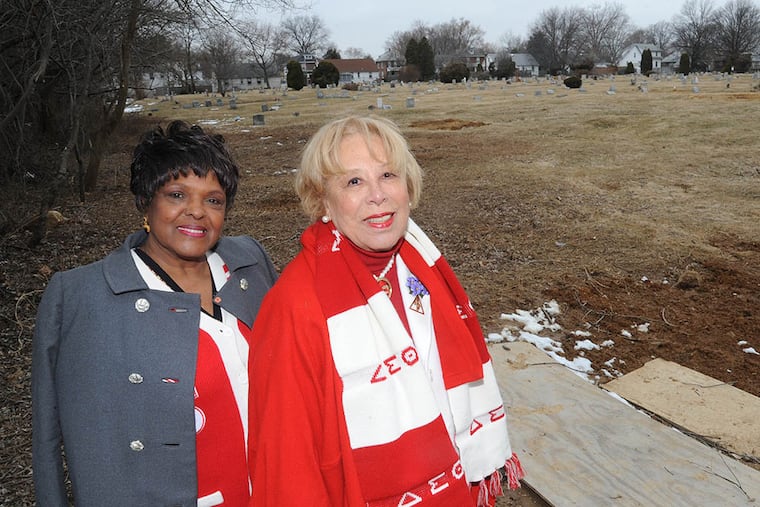Search for founder's history ends in tribute
Of the 22 young women who founded the nation's largest predominantly African American sorority, Pauline Oberdorfer Minor was very much a mystery.

Of the 22 young women who founded the nation's largest predominantly African American sorority, Pauline Oberdorfer Minor was very much a mystery.
The life of the Philadelphia High School for Girls graduate, who founded the sorority with fellow Howard University students in 1913, was a jumble of often disconnected parts.
Minor was valedictorian of her college class. She taught school in West Chester, wrote two books, and was an accomplished singer.
And yet, Delta Sigma Theta members only recently confirmed, she died as a housekeeper in Philadelphia and was buried in a place seemingly unfit for her accomplishments: with three other bodies in a pauper's grave in Delaware County.
"It was like a puzzle that somebody dropped on the floor, and the pieces scattered everywhere," said Geraldine Myles, former principal of Girls' High and a member of the sorority.
So Myles, of Mount Airy, and fellow sorority member C. Gloria Akers of Germantown, set out to gather the pieces and resolve the issue of Minor's final resting place, making it the last of the 22 founders' burial sites to be confirmed.
For more than a year, the women were part of the Pauline Oberdorfer Minor Project of the sorority's Philadelphia Alumnae Chapter. The initiative aimed to research the life of Minor, who helped start an organization that now has more than 300,000 members.
The effort started in 2013 when Akers, a member of the sorority's National Heritage and Archives Committee, was searching for a place to erect a marker honoring Minor. Knowing the founder was a Girls' High graduate, Akers turned to Myles for help.
Myles searched through the school archives and unearthed a record book, a then-standard "blue card" with basic information about Minor and her 1910 graduation photo.
Clad in a lacy white dress, Minor seemed serene, looking down and away from the camera.
"That picture captured me. It was the picture of a promise," Myles said. "It kept me digging."
Soon Myles was lead researcher in what became the Minor Project. She scoured books, census records, newspaper articles, telephone books, and death certificates.
A clearer portrait began to emerge.
Some speculation
Minor was born in Virginia in 1885, and her mother worked as a washer woman. To further her education, Minor was sent to live with an aunt in Philadelphia.
She graduated from Howard's Teachers College in 1914 as the school's valedictorian and went on to teach at schools, including the segregated Gay Street Elementary School for black students in West Chester and a school in Charlottesville, Va.
A mezzo soprano, Minor sang at recitals and wrote hymns that were testimonies to her Christian faith. She wrote two books about religion.
After a 1938 marriage, Minor reportedly divorced. At that time, she wrote fellow founder Madree Penn White and said "she was going through a bad time," Akers said.
No one knows how Minor's career evolved from teacher at black schools in the early 20th century to housekeeper in the midst of the civil rights movement.
"Pauline was by herself," said Akers, a retired Philadelphia public school principal. "She didn't have extended family with money or position, and her marriage didn't work out. She did the best that she could, and I admire her for it."
Minor died at Presbyterian Hospital in 1963. But where she was buried was the subject of some speculation. So Myles decided to follow up on a sorority member's recollection scuttlebutt about where Minor's remains might be.
"They say she's at Eden," was the word.
Myles called the Historic Eden Cemetery in Collingdale, Delaware County, where African American luminaries, including civil rights activist Octavius Catto, opera singer Marian Anderson, and Olympic athlete John Baxter Taylor, are buried.
"She's here," Myles said she was told by Junious Roan, a cemetery board member. "But she's not buried alone. She's in a pauper's grave with three other people."
"Back then, they put them in a pine box, dug a hole, and dumped them in it," Myles said.
Soon, three carloads of sorority members traveled in a caravan to the cemetery. They walked on the snowy ground to the unmarked gravesite, an open space near a hole in a nearby fence.
That day "we made a promise that we would rectify the situation," Myles said.
Give her dignity
On Saturday, the sorority will honor Minor with a luncheon, and an Omega Omega service, a sorority ritual presented at funerals that members believe Minor never received.
The service at First African Baptist Church in Darby Township will be followed by the unveiling of a headstone at Eden. The three people who are buried with Minor also will be named on the $10,000 monument donated by the Philadelphia Alumnae Chapter.
At Girls' High, the chapter has established a scholarship in Minor's name. A college internship for a student from Charlottesville has been started by a Virginia-area chapter.
The local group also plans to partner with Eden to help beautify and secure the cemetery.
"It is a miracle that she was discovered," said Thelma Thomas Daley, a former national president of the sorority who will lead the Minor ceremonies. "We hope on Saturday we will have given her the dignity that was denied her."
610-313-8211